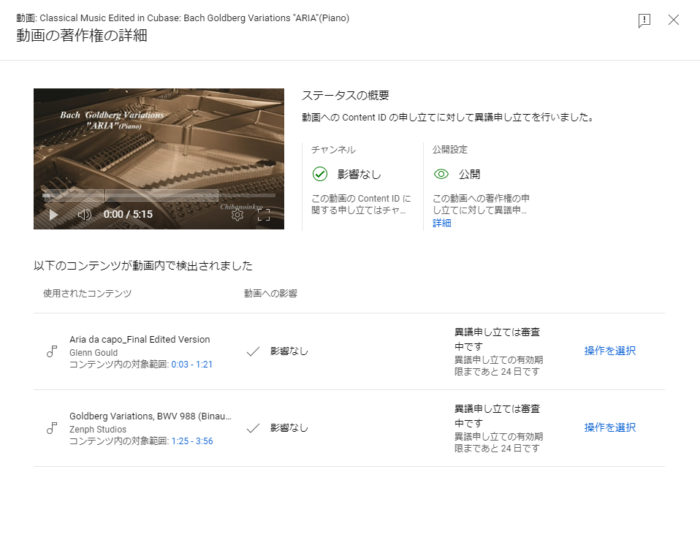When I uploaded Bach's Goldberg Variations, Aria (Piano version) to YouTube, I immediately received two copyright infringement claims from SME (Sony Music Entertainment). As usual, I filed a dispute right away, but these copyright claims seem rather strange.

The equivalent contents for each were found on YouTube and are posted below.
"Aria da capo_Final Edited Version Glenn Gould"
"Goldberg Variations, BWV 988 (Binaural Stereo Version): Aria da capo (Binaural Stereo) Zenph Studios"
The original contets for both is Glenn Gould's Aria da capo (same as the first Aria, repeated at the end of the variation). Now, Glenn Gould's Goldberg Variations are particularly famous for two recordings, one made in 1955, when he was a young man, and the other made in 1981, shortly before his death. If you check out this 1 and 2, it looks like they are newly created versions from recordings made in both of those years.
By the way, as you know, the tempo is totally different. So that means that YouTube's searching system totally ignores the tempo. The tempo of my performance, which is the subject of this complaint, is completely different from each other.
1. It seems to be a remastered version released in 2002 from the master recordings, which were originally taken track by track in 1981.
2. It appears to be the 2007 version, a new attempt to analyze the monaural recording from 1955 using the music analysis software Zenph and reproduce it with a Yamaha's Disklavier. It seems to have been recorded in binaural sound. Interestingly, the physical modeling piano I used, Pianoteq 8, seems to produce a very similar sound quality. Additionally, Junichi Miyazawa has provided a detailed explanation of this project (written in Japanese).
I have no idea what kind of functionality this Zenph software has. However, following the URL "zenph.com" will take you to Steinway & Sons' SPIRIO page. It seems that the Steinway & Sons "SPIRIO" piano, which can play automatically, may have been inherited from the Steinway & Sons "SPIRIO" piano. I think this is an interesting experiment. However, I don't have the viewpoint of reproducing a performer at all in my sequencing, so the direction I am aiming for is completely different.